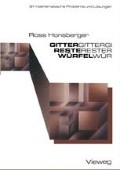Zusammenfassung
Bereits die alten Griechen haben entdeckt, daß einige natürliche Zahlen n die bemerkenswerte Eigenschaft haben, daß die Summe ihrer echten Teiler gerade die Zahl selbst ergibt. Für n = 28 gilt z. B.
AMM, 1975, S. 1015, Problem E 2500, gestellt von Richard Herr, University Park, Pa., gelöst von M. G. Greening, University of New Youth Wales, Australien.
Access this chapter
Tax calculation will be finalised at checkout
Purchases are for personal use only
Rights and permissions
Copyright information
© 1984 Friedr. Vieweg & Sohn Verlagsgesellschaft mbH, Braunschweig
About this chapter
Cite this chapter
Honsberger, R. (1984). Perfekte Zahlen. In: Gitter — Reste — Würfel. Vieweg+Teubner Verlag. https://doi.org/10.1007/978-3-322-83974-9_40
Download citation
DOI: https://doi.org/10.1007/978-3-322-83974-9_40
Publisher Name: Vieweg+Teubner Verlag
Print ISBN: 978-3-528-08476-9
Online ISBN: 978-3-322-83974-9
eBook Packages: Springer Book Archive

